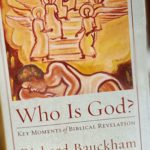The second instalment of Craig Hamilton’s four-part miniseries on the coming of Christ
Matthew chapter 2 starts off really strangely. It says:
Now after Jesus was born in Bethlehem of Judea in the days of Herod the king, behold, wise men from the east came to Jerusalem, saying, “Where is he who has been born king of the Jews? For we saw his star when it rose and have come to worship him.” When Herod the king heard this, he was troubled, and all Jerusalem with him. (Matthew 2:1-3)
Herod: Outsider from Within
There are lots of Herods in the New Testament—this one is the first Herod, Herod the Great, the King of the Jews. But the thing about Herod the Great, the King of the Jews, is that he wasn’t a Jew and shouldn’t have been king. He wasn’t from the tribe of Judah, or the house of David. He wasn’t actually a Jew—he was an Idumean, an Edomite, technically, one of Israel’s historical enemies.
He ruled by terror and murder. He was paranoid and at times seems legit crazy. At one point when he was literally on his death bed, he thought is own sons were trying to assassinate him . He’s literally on his death bed actually dying—so he had his own sons executed. By the last few years of his life it seems like he was completely out of his tree.
Magi: Outsiders from Without
As well as Herod, the enemy, the passage also talks about Magi who came from the East. By “East” it means East of Jerusalem.
These Magi were part royal advisor, part magician, part astrologer, part phoney. But wherever the Bible talks about this flavour of people, the wise men, the Bible is always negative towards them. We aren’t to trust the wise men. Moses was wiser then the wise men—they couldn’t keep up with him. Daniel was wiser than the wise men—they couldn’t work out the dreams, but the Lord was with Daniel. Wise men are aren’t spoken of positively.
Wherever the Bible talks about wise men, it is always negative towards them. We aren’t to trust the wise men. Moses was wiser then the wise men—they couldn’t keep up with him. Daniel was wiser than the wise men—the Lord was with Daniel.
As well as being a type of people that God doesn’t think favourably about, they’ve come from the East, which is where a lot of Israel’s enemies came from. Babylon was east of Israel. Assyria was East of Israel. These Magi, coming from the East, would have most likely come from one of these enemy nations.
And so these are enemies coming to Israel, along with the enemy pretender-to-the-throne Herod who’s already within the gates. And they all want to know where the new-born King of the Jews is to be found. The teachers of the law reply by quoting from the book of Micah that the King will be found in Bethlehem.
Micah’s Promise
What’s interesting is that the prophecy from Micah 5 promises a new David—a king who will shepherd his people, defeat their enemies and bring a great time of peace. Under this King, Assyria would come to Israel to be defeated by Israel. Instead of Assyria shepherding Israel, Israel would shepherd Assyria. There would be a new day where, instead of tribute and wealth flowing out of Judah to other nations, the wealth and tribute of other nations would flow in to Jerusalem. Instead of Israel paying other nations to leave them alone, the nations would pay Israel money. The nations would come, not to invade, but to join them under a new King, who would bring peace to the world. That’s Micah. This is the background to Matthew 2.
And now these Magi are coming from the East; from Assyria or Babylon or Persia—from those nations who invaded and conquered and terrorised Israel. And they are coming, not to make war, but to worship; not to plunder but to praise; not to take, but to give. Just like God had said they would.
And the promised King, the one who was to gather the nations and bring peace to the world, has already begun to fulfil his destiny—even as a baby. This is what the Magi symbolise: the enemies, the nations, bringing tribute to the King of the Jews. And they are overjoyed.
But not everyone is overjoyed. Not Herod and not Jerusalem. We’re told that “when Herod the king heard this, he is troubled, and all Jerusalem with him.” (v. 3)
Herod is right to be scared. Because the baby in the manger is not a usurper to the throne (like Herod)—he’s the rightful King of the Jews. And if Jesus is going to be king it means that Herod won’t be—he’ll have to stop pretending.
A Tale of Two Enemies
And so what we have here in Matthew 2 is a tale of two enemies: the Idumean Herod and the Assyrian Magi. Both of them are enemies. Both of them are outsiders. Neither of them belong. Both of them hear about Jesus. And they respond to him in two totally different ways.
And it’s the same every year in every place. There are really two ways to respond to Jesus. You can be like Herod and Jerusalem, and you can refuse him and ignore him. Or you can be like the Magi and meet Jesus, worship him and be overjoyed in him.
See more on the Incarnation in Craig Hamilton’s recent book Made Man















